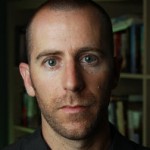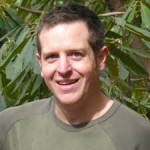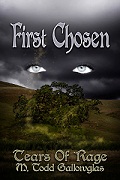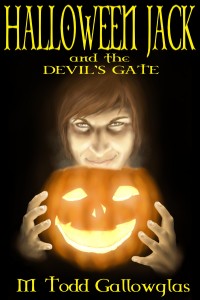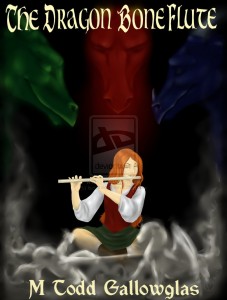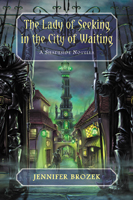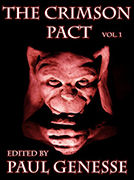Today’s Interview is with Christopher Kellen, the author many books, including the highly popular “The Arbiter Codex.” I conducted this interview after reading Elegy, and it is not necessary to have read the novel to enjoy the Interview.
MD: Central to your entire novel is the concept of manna. It drives everything about the plot and characters of this world. Can you please describe it, and the things that make it a unique magic/energy source in contrast to things it may be compared to?
Christopher: There are many fantasy stories and worlds that deal with some kind of life force, some central source of energy that wizards or others can draw from. When I began writing ELEGY, my central hypothesis was: what if that life force was actually deadly to everyone it touched? What if it drove them mad, turned them into monsters, outright destroyed them?
After I solidified that idea in my head, I realized that if the good side of the life force (which I decided to call ‘manna’) was deadly, then the bad side must be even worse. If it also had a bad side, there must be someone who was immune to the deadly power.
As of my latest Arbiter Codex book, LEGACY, more about the source of the manna, where it came from and just why it’s so deadly have been revealed, but I’ll avoid going into more detail to avoid spoilers.
MD: The title of the series is The Arbiter Codex. Could explain the roles of Arbiters in this world?
Christopher: Corrupted manna (that is, the ‘bad’ side I mentioned above) creates monsters. It turns normal things into hideous versions of themselves, and has actually nurtured strains of monsters going back generations that have become separate species.
The Arbiter’s job is to hunt down the places where the life force has become snarled. Normally, it flows like a river, but if someone exerts too much force on it, or if someone attempts to hoard it, the power spoils and becomes corrupted. This usually results in a great many terrible things: walking corpses, horrific monsters, and otherwise rational people gone insane. The Arbiters, working from their Tower, seek out those places, destroy the monsters, and return things to normal.
MD: The Arbiters have a few unique pieces of equipment and the way they interact with manna. Can you let us know of the heart blade, the manna blade and other things the Arbiters use to carry out their duty?
Christopher: I’ve dreamed about a crystalline sword for a long time. I have story fragments going back ten years or more that feature this particular concept, but none of them worked until I started writing ELEGY. There is heavy color symbolism featured in The Arbiter Codex, and the glow of the crystal manna swords represented it perfectly. It allows them to be instantly recognized, for no normal person could carry the power of the manna so closely to them.
The heartblade came out of a need to explain more about how the Arbiter’s world works. I debated heavily on just what it was that allowed the Arbiter to be immune to the power of the manna. Originally, the plan was for them to have been exposed to the power in small doses starting at a very young age, but that didn’t provide enough of the ‘hopeless world’ feeling that I wanted. Instead, I turned them into addicts; the heartblade is a tiny, needle-like blade that recharges itself over time (from a specific place, not from the manna as a whole) that must be driven into the Arbiter’s heart. It both recharges them and re-ups their immunity to the manna’s deadly influence. Without it, they would die.
MD: The Pulp influences on your novels is very visible. Let us know why you love this style of writing, and ways you incorporated it into your novel.
Christopher: I wrote ELEGY in 2008, for National Novel Writing Month. At the time, I had just finished a two-year stint as a graphic designer and formatter for a small press that was working with public domain properties like Tarzan, John Carter, and Lovecraft. During the process, I had learned a lot about the old pulp stories, and got introduced to Howard for the first time. I can’t really describe how immediately and thoroughly Howard’s work spoke to me. Around that time I was also introduced to Karl Edward Wagner, whose Kanestories I also count among my biggest influences, and I also discovered the work of Andrzej Sapkowski, the modern-day pulp writer ofThe Witcher.
From the moment I began writing, I imagined D’Arden Tal as a combination between Geralt of Rivia (the Witcher himself) and Solomon Kane – a religious zealot who is also an outsider, thought of with suspicion even though he is the only one who can save them.
Reading the pulp stories has led me to where I belong, I think. I’ve grown tired of stories where a ‘farmer’s boy’ finds some magic MacGuffin and saves the world from an overbearing evil. I like it when my characters are already competent before entering the story, when they’re already world-weary or at the top of their game. They face down some horrific evil, and they may change, or they may not. Conan took the crown of Aquilonia, but it never changed him. Wagner’s Kane was an immortal who never changed, no matter what he went through – he was always a magnificent bastard. Those are my favorite characters, and that’s what I’ve been striving for.
MD: The novel moves along at a very steady pace that makes it hard to put down. Is there anything specific you did to keep it that way, such as cut things out after your wrote it, make a conscious decision to not write anything that does not directly move the narrative along, etc?
Christopher: Well, I’m definitely glad that you feel that way!
Actually, ELEGY is sort of an interesting beast, because when I wrote it, I struggled for every word; and not in an angsty, ‘it-has-to-be-perfect’ way. For many years, it was very difficult for me to write any work, because they always came up short on the word count. I’d write what I felt was a complete short story and it would be 1,100 words. I’d try for a novel and get 13,000. Thankfully, this has now changed, but at the time it was very difficult.
Honestly, the reason that ELEGY is so tight is because every bit of plot was necessary to keep my words coming to hit the 50,000 goal for NaNoWriMo. In fact, in its first incarnation, ELEGY ended at precisely 50,000 words. I cleaned up a lot of the NaNo-isms and revised it so that it all flows together much more solidly now (and changed the ending significantly, which seems to be a theme for me) and it turned into a very tight, fast-paced (but short) novel.
MD: Are all your novels set in the same world? If not where else are they set in, and if so how do they tie together?
Christopher: Ever since I was very young, I’ve dreamed of having a world in which I could set multiple stories, at multiple times, in many different places. A world that I could explore, with characters that I loved.
At last, I think I’ve found that place, although I never expected it to come from where it did. When I wrote ELEGY, it was never supposed to have a sequel. It was just a discarded NaNo project. When I started revising it for submission to a now-defunct webzine, I began to realize that there was more potential in it than I had originally thought. It took a lot of thinking, but I finally decided that I would call the world “Eisengoth” and give it a heavily-Germanic influence.
Right now, I have three series set in this world of mine: The Arbiter Codex, The Elements of Sorcery (book 2 launched July 20, 2012), and Tales of Eisengoth.
The core story is found in the Arbiter Codex. The Elements of Sorcery is exploring the history of one of the secondary characters, the sorcerer Edar Moncrief. The Tales of Eisengoth contain other stories about the world, the characters, and their history.
MD: The instant feeling a lot of people get when reading your novel is “Conan meets Star Wars.” How would you describe your series in your own words, and how much of the above description seems true to you?
Christopher: I don’t disagree with that assessment, although the quasi-religious wanderer is inspired less by the Jedi than it is by Solomon Kane. The crystal swords certainly do evoke the idea of the lightsaber, which wasn’t entirely unintentional. I mean, come on. There’s pretty much nothing more awesome than a lightsaber!
Really, though, I like to think of my work as a spiritual aspirant to the great pulp work that has been mostly forgotten. People don’t think of Conan when they think of fantasy (a string of miserable adaptation attempts to bring it into the modern consciousness doesn’t help), they think of Tolkien, and Dragonlance, and Harry Potter (high fantasy, Dungeons-and-Dragons-derived-high-fantasy, and modern fantasy respectively). I want to bring the idea of heroic fantasy back to life in my work: Howard, with modern sensibilities; and Lovecraft, with just the terrifying monsters, and without the horrifying racism.
MD: What is your background with writing? Any formal training, influences, or early projects you did that drive how you write?
Christopher: The only training I have is the thousands of books and stories that I’ve read. I’ve never formally studied the writing process, but I started reading very young, and I’ve never stopped. I was also very fortunate to get brought into my parents’ D&D group at the tender age of 6, and when my Dungeon Master moved away, I became the DM for my group of friends at about age 12. That started me on the world-building process, and to this day I absolutely love gaming and collaborative storytelling.
Unfortunately, there’s also a downside to that last part: the tropes and methods of role-playing are so deeply ingrained in my consciousness that I often have to struggle against those instincts in order to write!
I started doing NaNoWriMo in 2005, and it was mostly just a way to have some fun during the month of November, since I kind of liked to write (but I would never finish anything that I started). Doing NaNo was really the propulsion that led me toward where I am now, and I would never have done that without my then-girlfriend (now my wife) telling me that I should.
All of those things combined, plus a healthy love for the methods of storytelling, some of Holly Lisle’s no-nonsense writing techniques, a deep desire to communicate, and a lot of encouragement are really what keeps me going.
MD: Do you have any dream projects you would want to work on? This could include original takes on existing properties, genres you have not written in before, etc.
Christopher: Well, I wrote a science-fiction short story (available as Dutiful Daughter) which I need to turn into a full-blown novel at some point. That’s definitely on the horizon.
I’ve never been overall too comfortable working in other peoples’ worlds or with their characters; I’ve always preferred to work with my own. Still, as a creative exercise a few months ago I re-structured the plot of the video game Mass Effect 3 to fit my sensibilities, and that was a lot of fun as a thought experiment.
Right now, my dream is really to keep learning and growing; to try out different genres and different kinds of stories, and to keep improving my methods. If something else should come up along the way, I’ll take a look at it.
I’d also like to (at some point) do a collaboration with another author. I think working on story genesis with another person would be a lot of fun!
MD: Do you have any novels coming up? If so let us know more about them.
Christopher: Well, I just released Sorcerer’s Crime, which is Lesson II of the Elements of Sorcery, on July 20. Right now I’m back in the planning and initial drafting phase for a project which I’m tentatively describing as a ‘steampunk/fantasy political thriller’, which will be significantly different than anything I’ve done before. Since it’s just in the initial phases, it’s hard to say when(or if, frankly) it might be done.
My short-range plans (next 6 months or so) also include the next entry in the Elements of Sorcery (since short fiction is much easier to write, edit and publish), and then I’ll get started on Book Three of the Arbiter Codex. Farther out than that… who knows?
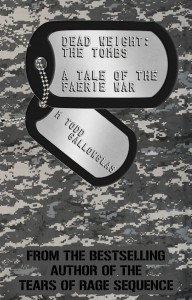 “This is an amazing time to be a fan. At no other point in history has there been such a popular acceptance of geek and nerd culture coupled with the ability for independent artists to get their work out in front of the public…Without having to rely on corporate giants to decide what is worth presenting to the consumer, each artist, in this case M Todd Gallowglas, can present their material directly to the consumer. That gives us the power. We don’t have to read, play, watch, or listen to things created for the lowest common denominator or an overly broad and unfocused demographic, we can find exactly what we want, and give our money directly to the artist. I love this symbiotic relationship. If you want to immerse yourself in a story of a junkie bard veteran from a war where San Francisco was the front lines in an Unseelie incursion, you can. And believe me, I do.”
“This is an amazing time to be a fan. At no other point in history has there been such a popular acceptance of geek and nerd culture coupled with the ability for independent artists to get their work out in front of the public…Without having to rely on corporate giants to decide what is worth presenting to the consumer, each artist, in this case M Todd Gallowglas, can present their material directly to the consumer. That gives us the power. We don’t have to read, play, watch, or listen to things created for the lowest common denominator or an overly broad and unfocused demographic, we can find exactly what we want, and give our money directly to the artist. I love this symbiotic relationship. If you want to immerse yourself in a story of a junkie bard veteran from a war where San Francisco was the front lines in an Unseelie incursion, you can. And believe me, I do.”




